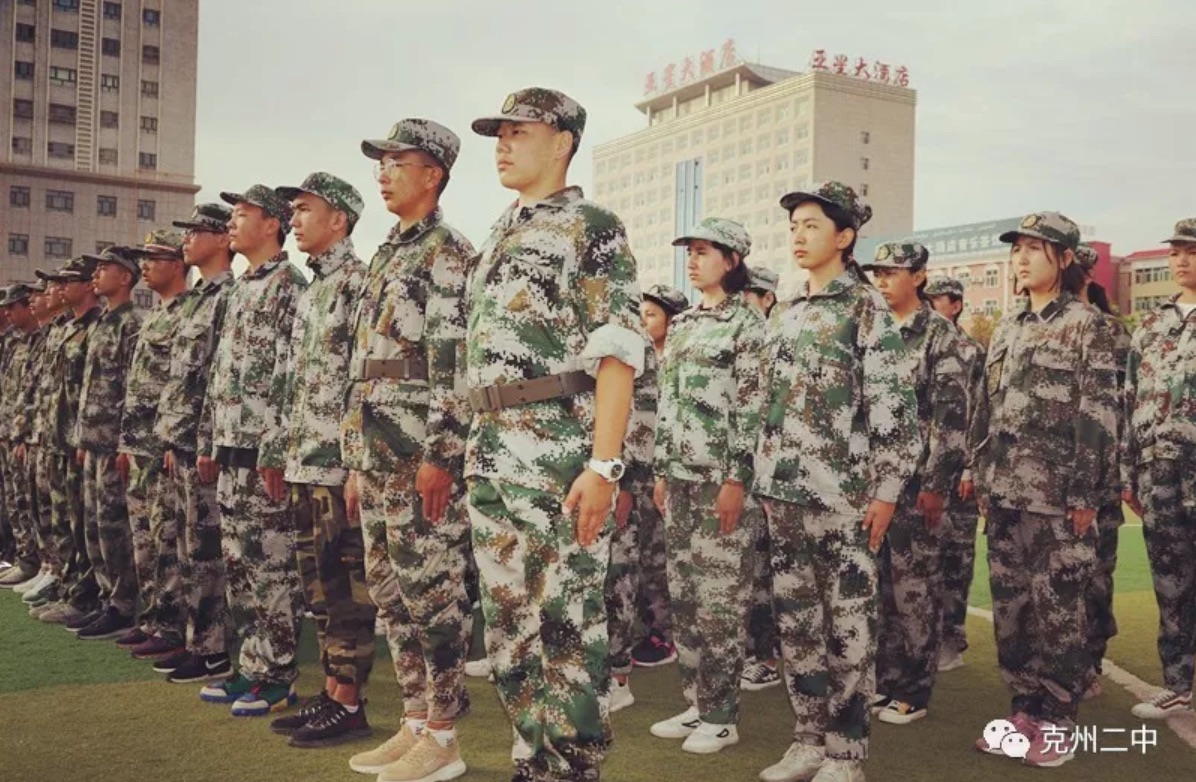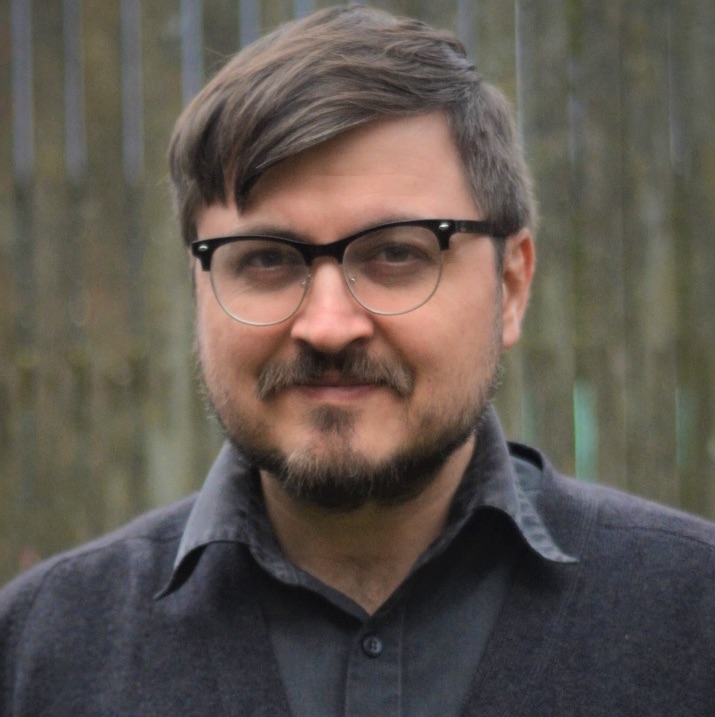Xinjiang education reform and the eradication of Uyghur-language books

The “bilingual” education system introduced over the past decade in Xinjiang is better characterized as an attempt to transform minority education systems in the region. There have been frightening consequences for Uyghur culture.
Image: Uyghur and Han students at a high school in Atush, Xinjiang perform military drills in 2019.
![]()
Names have been changed to protect the identities of the individuals.
In March of this year, Kaiser noticed that his 15-year-old sister Abida began to interject Chinese phrases into their Uyghur conversations. Up until that time they had never spoken Chinese with one another. The words she used signaled her “quality” (素质 sùzhì) as an educated young woman. They often ended with the soft-toned drawn-out particle “a” (啊), as in phrases such as “tǐng hǎo a!” (挺好啊) — “Pretty good!”— or “wǒ xǐhuān’a” (我喜欢啊), “I like (it).”
The siblings didn’t speak frequently, because it wasn’t safe for them to talk. Kaiser was attending college in North America while Abida was just finishing middle school in a small town near the city of Kashgar in southern Xinjiang. Usually they spoke only when a mutual friend who lived in a nearby city visited the family and allowed Abida and their parents to make a WeChat call on his phone. Ever since Kaiser’s younger brother was taken to a “reeducation” camp in 2017, it had become too risky for the family to contact Kaiser directly from the village.
When Kaiser asked Abida why she started using these “cute” Chinese phrases, she said it was because all of her classmates did this at school and she did Chinese-language homework every day after school, so Chinese was always on her mind. She told Kaiser that she felt a lot of “pressure” (Uy: bıssim) to speak only in Chinese throughout most of the day. As she spoke, she began to cry. At the end of the school year there would be a major Chinese test. If she did not pass it, she would not be allowed to go on to high school. Instead, she would be sent to a vocational school where she would be trained in Chinese and political ideology before being sent to work in a factory. Essentially, her education would end if she didn’t pass the test. She felt as though her entire life hung in the balance. For as long as she could remember, she had dreamed of becoming a doctor. It was a lot of pressure for a 15-year-old.
![]()
As scholars have long noted, the “bilingual” education system that was introduced over the past decade in Xinjiang is better characterized as an attempt to transform Xinjiang minority education systems, moving away from the maintenance of local native languages and traditions toward a Chinese-medium education. One of the ways this was ensured was through the removal of Uyghur students from their home communities through a “boarding school” (Uy: yataqliq mektep) system. First, nearly all schools above eighth grade became residential schools, where students are held behind walls except on weekend home visits. Then, beginning in 2017, many elementary schools and nurseries also became residential schools. Uyghur children of all ages are increasingly separated from their parents and raised in a non-Muslim, Chinese-speaking environment.
The Chinese test Abida was talking about was in fact a “senior high school entrance exam” (中考 zhōngkǎo). Since 2017, as reeducation internment camps were built across Xinjiang, this exam — like China’s college entrance exam — has been dramatically reformed. In the past, the exam, a prerequisite for all students who move from a local residential junior high school to a residential high school in a larger town, was offered in either Chinese or the local language of minority students.
Beginning in 2017, entrance exams at all levels of the Xinjiang education system began to change. For minority students taking a test in their non-native language, the bonus points they received was slashed from 50 to 15. Now, so-called bilingual education evaluations stressed that ethnic minority students should “master and use the nationally used language and writing system,” i.e., Chinese. Furthermore, only in some cases would the ethnic minority literature portion of the test be offered in the native language of minority students. The announcement that guided this reform stated plainly that one of the primary goals of the exam was to send more minority students to Han-majority schools, while also having schools with a high number of minorities receive more Han students.
Another primary goal was to separate students from the regular high schools into a “secondary vocational training enrollment plan” by using a minimum admission grade. In the context of Xinjiang, this meant that as early as the age of 15, Uyghur students were being directed down a path that would lead them to forms of assigned or coerced factory work as “surplus laborers.”
Beginning on September 1, 2017, primary schools across the region began to change their “bilingual” curriculum to a Chinese-only “mode 2” program in anticipation of these Chinese-language exams. An announcement published by the education department of Bortala County, a county in a prefecture near Abida’s home, noted:
From the first grade through all primary and junior high school grades, all classes will be taught in the “language and writing system used by the country” (国家通用语言文字 guójiā tōngyòng yǔyán wénzì), while at the same time an ethnic language literature course will be added. In the end, only the national language (i.e., Chinese) will be taught. Chinese language class will be increased from seven class periods to nine periods per week in order to further strengthen students’ oral communication and literacy training and to improve students’ listening and speaking ability in Chinese.
Counties across the region worked to implement similar measures under the auspices of a region-wide 2017 directive titled “The Standard Plan for Bilingual Education Curriculum in the Compulsory Education Phase of the Autonomous Region” (自治区义务教育阶段双语教育课程设置方案 zìzhìqū yìwù jiàoyù jiēduàn shuāngyǔ jiàoyù kèchéng shèzhì fāng’àn). In Kashgar City, an even more intensive program of Chinese language immersion was set in motion. In the northern part of the region in Ghulja, similar steps were taken. As a Xinjiang teacher told Amy Anderson via WeChat, “We have to try to teach 6 year-old kids who have never heard Chinese before fully in Chinese. Often the kids can’t even read even up to grade 3. The education system is a disaster.”
![]()
Back in Abida and Kaiser’s small village, this new education regulation meant that Abida was thinking in Chinese every waking minute. She said she loved her native language, but she did not have time to speak it and she had few opportunities to read it. As she told Kaiser, her sole Uyghur “literature” class centered on translations from Chinese that focused on the political rhetoric of “ethnic solidarity” (民族团结 mínzú tuánjié).
As a recent report from Christian Shepherd of the Financial Times notes in explicit detail, the Uyghur education administrator Tashpolat Tiyip and editor Satar Sawut were given suspended death sentences in 2017 for their role in creating Uyghur-language textbooks used in the only Uyghur literature class in the “bilingual” system. They, along with more than 80 other intellectuals, were charged with plotting to “secretly act to split the motherland.” A state-produced film titled The Plot Inside the Textbooks, which was screened in classrooms across the region, accused them of sourcing much of the content of the curriculum from Uyghur literature rather than Chinese sources. Instead of sourcing 60 percent of the text in Chinese sources and 10 percent from foreign sources and then translating them into Uyghur, they had drawn nearly 60 percent of the content directly from Uyghur sources. Furthermore, using a keyword search, the word “China” had appeared only four times in one elementary school text.
Although all of the texts included in the curriculum had been previously approved by Chinese state censors, the film alleged that the actions of Uyghur educators were done for “the purpose of separatism” and “inciting ethnic hatred.” It alleged that the curriculum had “severely poisoned” the minds of Uyghur students and resulted in “endless heinous crimes,” such as violent terrorism and separatism. Rather than emphasizing Uyghur differences, the last remaining Uyghur-language class that remained part of the curriculum should emphasize Chinese national identity (中华民族 zhōnghuá mínzú) and opposition to pious forms of Islam. In 2018, Uyghur officials began to make statements that it was no longer patriotic to speak Uyghur.
Earlier this year, the police and other state workers began a process of fully eliminating Uyghur-language materials from Abida’s environment. In another 2019 video chat with his father, Kaiser found out that his collection of Uyghur literature books that he had left for Abida had been confiscated by the police, despite the fact that all of them had previously been approved. His father told him that there were no Uyghur-language books left in their village.
![]()
In June, Abida took her high school entrance exam. After several weeks of waiting, she saw the announcement. She and six other young people from their village had passed. More than 25 of her classmates had not. According to the announcement, out of their entire county, which had a population of 229,000 in 2010, only around 3,000 students passed the test. She told Kaiser that she was both relieved and saddened by the results. She was sad that so many of her friends were being sent down another life path.
Nearly every family in their village was missing a working-age person. They were either in a reeducation camp or had been assigned to work long hours on an industrial park assembly line in the city. For most students, being sent to vocational high school meant a life of factory work.
She also knew that life at the residential high school would not be easy. It was located over an hour away from her village in the county seat. Unlike before, when she could visit her parents once per week, now she would only be able to come home once every two weeks. Sometimes, when there were arbitrary restrictions on travel because of a national holiday or congress, it would be even longer.
From Kaiser’s perspective, what his sister is going through is an echo of the colonial systems in North America and Australia that he has read about in school. The Xinjiang school system is stealing a generation of Turkic Muslim children from their native societies. As studies of such systems have shown, residential schools produce forms of cultural genocide by concentrating and systematizing the destruction of native languages, religions, and traditional knowledge. Kaiser said, “The camps are bad, but it is things like this school system that will produce even more lasting damage.”
In September, Kaiser had another video chat with his mother and sister as they were visiting a nearby city and had a more secure way of calling him. Abida said that life at the new school was hard. Everyone spoke in Chinese all the time. She said she had heard that the classrooms and dorms had microphones that could identify each student based on their voice signature. She was afraid that the system would detect her if she spoke in Uyghur. She said that she and a few of her Uyghur classmates still spoke to each other in Uyghur in whispers when they walked around the sports field outside and when they were sure they were alone in the bathroom. Before she hung up, she promised Kaiser that no matter what, she would never forget her native language.
Darren Byler’s Xinjiang Column is published on the first Wednesday of every month. Previously:






